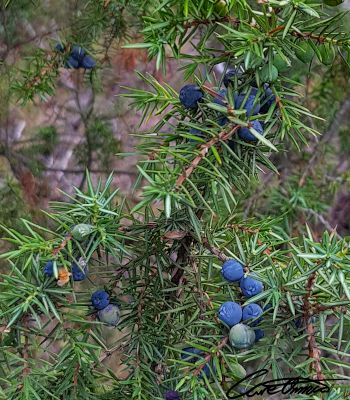Are Juniper Berries Poisonous? When Should I Avoid Them?

Juniper berries come in many different varieties.
The most common juniper is Juniperus Communis.
It’s also the one that’s regarded as the safest to eat.
But there are some plants of Juniper that are really poisonous.
You need to be careful when picking juniper berries so you know that you have the right kind.
But even if you know you have the right variety you still have to be careful.
Read all about why below.
Table of Contents
All Juniper Are Toxic
All junipers are toxic but certain varieties of juniper berry are considered safe to eat.
That doesn’t mean they don’t have any toxins in them but that they contain so low amounts of the toxic substance that nearly everyone should be ok.
Other varieties, those that aren’t considered safe, contain very high levels of the same substances and can make you very sick.
It can be difficult to accurately distinguish between different species of junipers, so if you want to pick juniper berries, you need to be sure you have the right species.
Juniperus Communis - The Safest Juniper
Even though Juniperus communis is regarded as the best and safest juniper berry to eat, there’s still reasons to be cautious.
Juniper berries are very strong so even at normal doses/amounts, juniper berries have a strong effect on the kidneys and can cause increased stress on them.
Eating juniper berries for a long time or in high doses can be unsafe and cause kidney problems and irritation of the gut.
Seizures and kidney damage have been reported in individuals who took more than 0.35oz or 10g of Juniper per day or who took high doses of Juniper for longer than 4 weeks. (source ◳)
Special notice for pregnant or lactating women
If you are pregnant, lactating or have kidney problems, stay away from juniper berries. We have written more about this in our article: What are Juniper Berries Good For?
What Happens If I Eat To Much Of The Common Juniper
In case of prolonged use or overdose your urine will start smelling of violets.
There may be renal irritation and pain in and near the kidney, strong diuresis, albuminuria, haematuria, purplish urine, gastrointestinal upset and accelerated heartbeat.
Rare symptoms that can occur are convulsions, metrorrhagia and even abortion. (source ◳)
Juniperus Sabina - Really Poisonous
The berries of some species, such as Juniperus sabina also known as Savin Juniper, are toxic and consumption of them is inadvisable. All parts of the Savin Juniper plant are poisonous!
The whole plant contains a Savin oil, especially the branches tips and the leaves.
If the oil in the Savin Juniper is ingested the outcome can be fatal. Ingested in small quantities can in best case lead to irritation of the mouth, diarrhea, vomiting, pain in stomach and colics. (source ◳)
Also, the berries are poisonous. Ingestion of Savin juniper berries can cause bloody vomiting and bloody diarrhea.
How Do I Differ Between The Common Juniper And The Savin?
There are differences between the common junipers and the savin juniper.
I hope that you after reading this far agree that It’s important that you don’t eat the wrong variety.
Luckily the junipers are quite easy to tell apart as the common juniper has sharp needles and the savin juniper has softer, scale-like needles or leaves.
The common junipers needles are jointed at the base, while the savin junipers merge smoothly with the stem.
Videos that show you the difference between Juniper Communis and Sabina
Here's a short video we made of a Juniperus Communis.
Here's a short video of Juniperus Sabina or Savin where you also learn how to pronounce it.
Should I Stay Away From All Juniper?
There are some that should stay away even from the safest Juniper berries.
These include:
- People who have intestinal and kidney diseases, because juniper berries can act as a gastrointestinal irritant. Excessive doses can cause renal damage.
- People who are pregnant, as juniper berries are considered uterine stimulants and may cause miscarriage in high doses.
- People that are lactating.
- Small children. Just don’t, it’s better to be safe than sorry.
(source ◳)
Conclusion: Juniper Are All Toxic But Some More Than Others
Juniper is a very common bush. You’ve probably seen a few.
Juniper is a genus of different species, which are all somewhat toxic. There are those that are considered safe to eat because of the low amount of the toxic substances, but there are also the one that you really need to look out for, the savin juniper.
The species that are used for culinary reasons are the Juniperus communis, the common juniper.
There are other species that have the same amount of low toxicity, but all others are usually considered too bitter to eat.
Remember to be careful and thorough that you are just using the common juniper berries.
But also remember not to overdo it. Even though Juniperus Communis is considered safe to eat, the oils that you’re after for their health benefits and unique taste and smell is also very strong and powerful that could give you problems or make you sick.
Stay safe!



 TM
TM